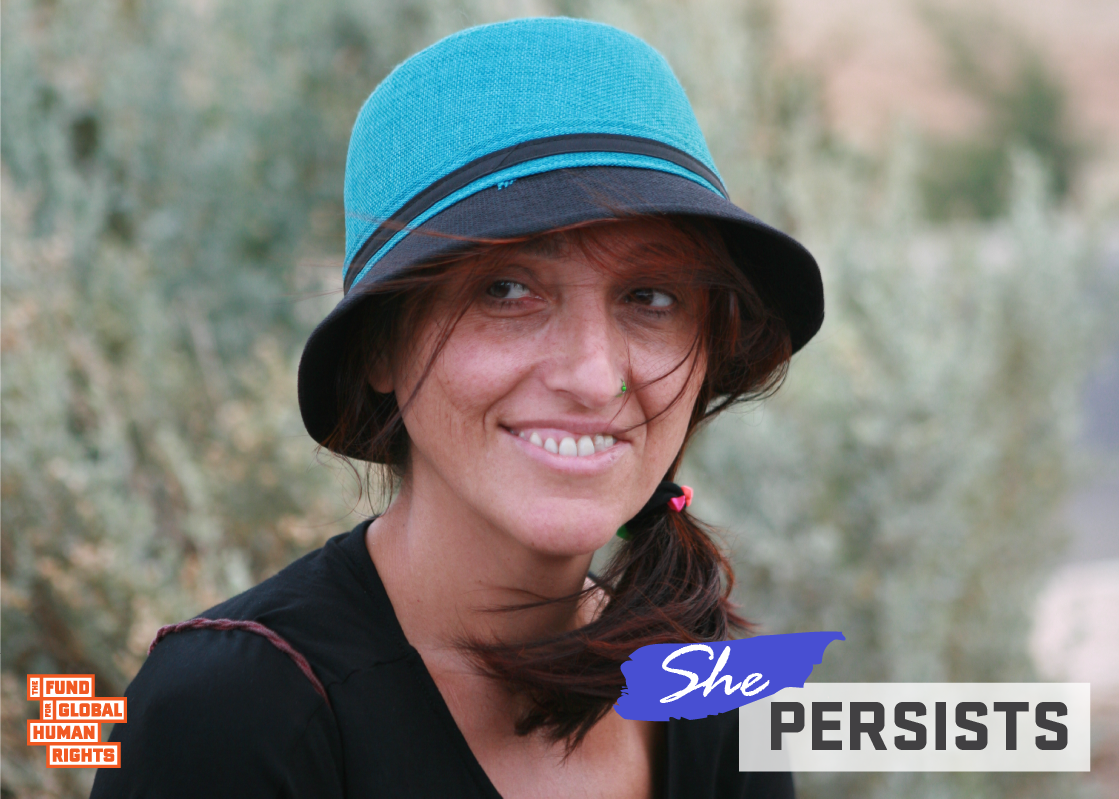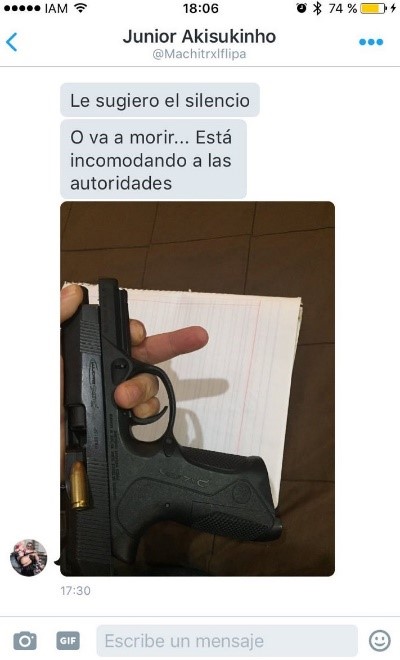This article was published more than 7 years ago.

From the global women’s marches to the #MeToo movement, it’s been quite a year for women in activism. As we close out 2017, the Fund for Global Human Rights is honoring women like Helena with our #ShePersists campaign—a series of stories that showcase the courage, strength, and resilience of the women human rights defenders we support around the world. Donate here to support activists like Helena and read on for her inspiring story.

“I suggest silence or you will die…You are bothering the authorities.”
This was the text message Morocco-based migrant rights activist Helena Maleno Garzón received at 5:30 PM on August 15. In addition to the menacing words, the sender—whose name Helena didn’t recognize—included a photoof a Berretta pistol with a single bullet. The gun was lying loosely in the hand of the antagonizer, whose middle finger was conspicuously outstretched.
Helena is no stranger to death threats—she has received several due to her work protecting migrants from abuse—but this text crossed a line. Instead of simply carrying on with her work, she decided to take a public stand. She notified her organization, Caminando Fronteras (Walking Borders), shared the text with her network of activists and media outlets, and lodged a formal complaint with the authorities.
Then, in the ultimate show of fearless defiance, Helena tweeted a photo of the threatening text with a link to a statement signed by over 200 civil society groups expressing their support for her. Her message to her harasser was clear: you cannot intimidate me.
Four months later, Helena is alive, but her situation remains precarious. Authorities have ordered her to appear before a Moroccan court tomorrow, December 27th. Helena and her lawyers suspect she is being called to answer to trumped-up charges of human trafficking—a move that was likely orchestrated by Spanish authorities. It’s just the latest in a series of attempts to silence her; but as Helena has shown, she won’t be muzzled.
As the co-founder of Caminando Fronteras—a grassroots group supported by the Fund for Global Human Rights—Helena works to defend the dignity of some of the world’s most vulnerable people: migrants. Most of the people she works with have fled their homes in search of a better life, only to find themselves trapped in a kind of interminable limbo in North Africa, or nearly drowned in the Mediterranean Sea. It’s a commitment to humanity that can be traced back to Helena’s childhood in rural Spain, where she first encountered racism and discrimination, and was inspired to end it.
Witness to Injustice
Born in 1970, Helena grew up in El Ejido, a small town in the Almería province of southern Spain. As a girl, she vividly remembers how poverty drove the men from her community to migrate north in search of work. But in the 1980s and 90s, things began to change. After decades of trying to cultivate the region’s dry, rocky soil, farmers discovered a solution: the greenhouse.
The use of greenhouses turned Almería into an agricultural powerhouse, creating opportunities that spurred an influx of North African migrants. Desperate for work, these migrants were often exploited and abused by their employers, who paid them meager wages, forced them to work in dangerous conditions, and fired them at will. As the migrant population in El Ejido ballooned, anti-migrant sentiment rose. These sentiments erupted in unprecedented racial violence in 2000.
Appalled by what she saw, Helena decided to act. A journalist by trade, she set out to make a documentary about migrants trying to reach Spain, as a way of humanizing their struggle. In 2002, she moved with her young son to Tangiers, Morocco. Fifteen years later, she’s still there.

In Defense of the Defenseless
Shortly into filming her documentary, Helena met a young man who had tried to jump the razor wire fences that separate Morocco from Ceuta—one of two Spanish enclaves separated from the mainland by the Mediterranean Sea. Severely injured from his attempt, the man was rushed to the hospital, only to have his IV ripped out by police who then chased him away. The denial of the man’s right to medical attention revealed to Helena that there was no justice for migrants in Morocco.
In the years that followed, Helena began making inroads into Morocco’s diverse migrant communities. Made up of Sub-Saharan Africans, North Africans, and some Middle Easterners, these communities have internal governance structures, rules, and traditions that are unique to them. Through her relentless dedication to their well-being, Helena—an outsider—gained the communities’ trust. This acceptance both protects her and allows her to work with migrant communities in ways most international aid workers cannot.
To understand why migrants hold Helena in such high esteem, one need only look to the events of October 2005, when she received a call that 500 Sub-Saharan African migrants—including pregnant women and children—were stranded with no food or water in the desert. The migrants had been loaded onto buses in Ceuta, Casablanca, and Rabat, then driven to the Algerian border. Helena immediately informed her media contacts to get the story in the international press, and within days, Doctors Without Borders had dispatched a mission to help the stranded migrants.
Unfortunately, Morocco continued to ship migrants to the desert. During a mission to deliver food and water to a convoy of the displaced, Helena was involved in a near-fatal car accident. To this day, she suspects the accident was caused by someone purposefully tampering with her brakes. Instead of receiving medical attention, she was arrested, delaying her repatriation to Spain for treatment. She was eventually released and got the care she needed, but spent one year in a wheelchair due to a badly injured leg.
The Power of Collective Activism
If it weren’t for Helena, no one would have known about the hundreds of migrants stranded in the Moroccan desert. While documenting the abuse was important, Helena knew that documentation alone wouldn’t stop it from continuing. In 2007, she joined a group of like-minded activists to form Caminando Fronteras. The collective uses strategic litigation and documentation to shed light on the exploitation, abuse, and trafficking of migrants—especially women and children—at the Morocco-Spain border. Their far-reaching networks span migrant communities and migrants’ rights organizations in regions of departure (mainly Northern and Sub-Saharan Africa), transit (North Africa), and arrival (Europe).
Working with their networks, Caminando Fronteras flags cases of abuse, including beatings and illegal returns of migrants by Spanish and Moroccan authorities. They file charges on behalf of migrants in national and regional courts. They locate the bodies of migrants who have drowned in the Mediterranean while trying to make the perilous voyage from Morocco to Spain. And when needed, they help bring families closure when their loved one has died along the journey.

The Ripple Effect
As one of the most visible, vocal members of Caminando Fronteras, Helena has played a key role in their successes. An example is her work with the relatives of 15 Cameroonians who died trying to reach Ceuta. In February 2014, the Spanish Guardia Civil threw smoke grenades and shot rubber bullets at the migrants as they tried to swim from Morocco to Ceuta. Their bodies later washed up on a Moroccan beach, and many believe the Guardia Civil is responsible for their deaths.
Upon hearing about the case, Helena travelled to Cameroon to meet with the victims’ families and help them form an organization to demand justice. With their help, Helena produced a festival-quality documentary that tells their stories. The film put a human face on the migrant crisis for audiences in Europe and beyond, and has emboldened the families as they continue their quest for justice.
Helena has also saved the lives of countless people who have attempted the harrowing journey from North Africa to Spain. During a trip to Morocco in 2016, the Fund’s Migrants’ Rights Program Officer, Chloée Ponchelet, witnessed this work firsthand. While Helena, her colleagues, and Chloée were en route to visit a migrant community in the city of Nador, a migrant called Helena and told her that 29 people who had boarded a zodiac boat and left Morocco in the middle of the night were missing.
Within minutes, Helena had relayed the information to Salvamento Maritimo—the Spanish search and rescue agency. She even gave the agency the approximate coordinates of the boat, which she based on her own knowledge of the migrants’ likely trajectory. Within hours, all 29 people had been rescued. It’s a service she’s provided more times than she can count, and one that has sent ripples of hope across communities that badly need it.
On the Frontlines of the Fight for Migrants’ Rights
Earlier this year, Helena summed up the situation for migrants in North Africa during a convening organized by the Fund in Sicily.
“There is a war taking place at European borders,” she said. “In this [war], there are…zones in which fundamental human rights have been [trampled].”
Perched on a walkway overlooking a rocky beach, with her back to the Mediterranean and her hair whipping in the wind, she said, “This sea has become a no-rights zone for migrants.”
Helena is on the frontlines of the war, and she’s fighting with and for the underdogs. Over the years, her advocacy has led her to be arrested, physically attacked, and threatened with death and rape. Yet she continues, because she knows that if she doesn’t stand for the rights of this forgotten group of people, they will have one less soldier in the struggle for their humanity—and for Helena, that humanity is all that matters.


